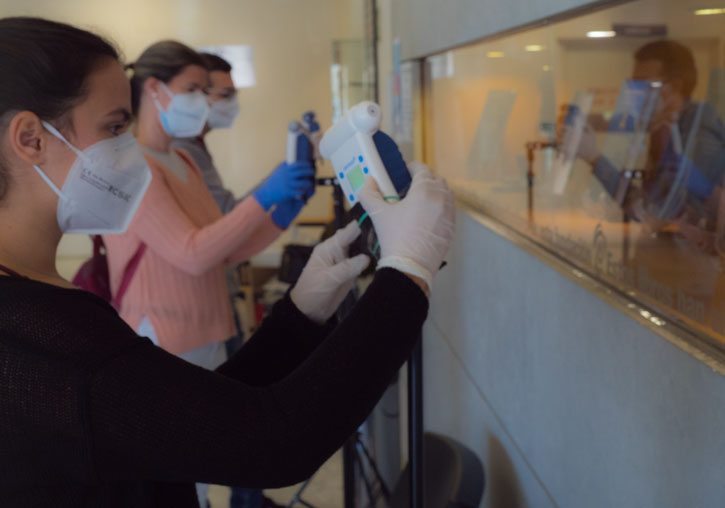The AIRCOV research project rules out the presence of SARS-CoV-2 in the indoor air of the Faculty of Chemistry
- Scientific Culture and Innovation Unit
- May 15th, 2021

The results of the AIRCOV project, led by the Department of Analytical Chemistry of the University of Valencia (UV) and the Foundation for the Promotion of Health and Biomedical Research of the Valencian Community (FISABIO), have ruled out the presence of SARS-CoV-2 in the indoor air of university classrooms. The study addressed the presence of coronavirus SARS-CoV-2 and other respiratory viruses, fungi, and bacteria in aerosols using different types of collectors.
In addition, during the three days of sampling, saliva samples were taken from 72 students and teachers that were analysed using the real-time PCR technique. The results of all these tests have been negative.
“The overall results of the study indicate that the measures taken by the faculty against the virus caused by COVID-19 have been effective and that the indoor air quality in the sampled classrooms is in line with the recommended values”, explains Vicent Yusà, associate professor of the Department of Analytical Chemistry of the UV and head of the area of research in Food Safety of FISABIO.
The research team, led by Vicent Yusà (FISABIO-UV), the UV professor of Analytical Chemistry Salvador Garrigues and Xavier López-Labrador (FISABIO), has used three types of samplers that capture all the particulate matter (aerosols). For each dependence, different chemical parameters of air quality were also measured, such as CO₂, CO, NO2, suspended matter, formaldehyde, relative humidity and volatile organic compounds (VOCs).
The study concludes that the air quality of the two classrooms studied is adequate. Only in the case of CO₂, some volatile compounds and particulate matter were observed certain peaks at specific times, without too much relevance for the air quality assessed throughout the school day.
The pilot project carried out at the Faculty of Chemistry has validated the methodologies used, and the results of the study will continue to formulate management proposals to reduce the chances of infection in public indoor spaces, such as university classrooms or primary care centres.
















